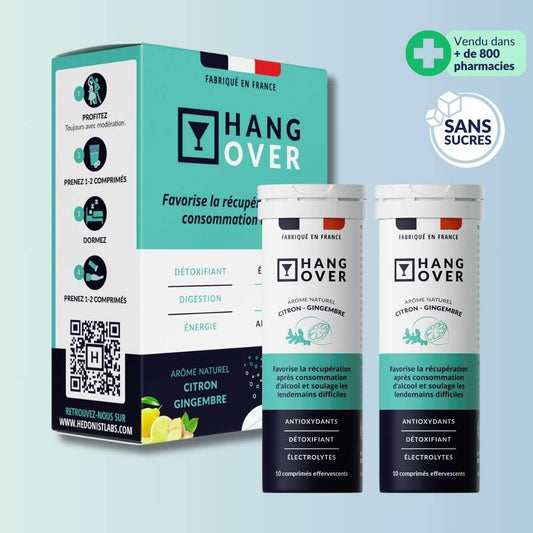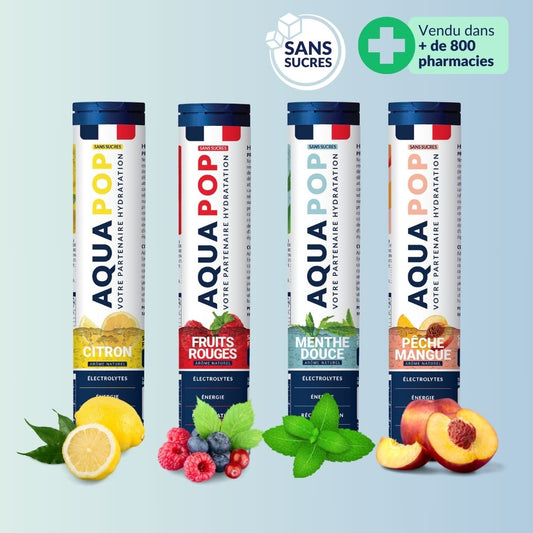Hedonistlabs laboratory
Much more than a simple response to heat, sweating is an essential function that helps our bodies maintain a stable temperature and eliminate toxins. But what exactly triggers this process?
THE IMPORTANCE OF WATER FOR THE HUMAN BODY :
Water is crucial for digestion. It is essential for breaking down food, making it easier for our bodies to absorb essential nutrients. Above all, it maintains hydration tissues and organs, helping them to function properly.
Water plays an essential role in regulating the body temperature body temperature. Through perspirationit dissipates excess heat, helping to prevent the body from overheating, especially during intense physical activity or hot weather.
Water is a key element in the transport of nutrients and oxygen to cells, as well as in the elimination of waste and toxins through urine and perspiration.
But where does all the water in our body hide? It's worth noting that around 60% of the average adult's body weight is water. This water is found mainly in the cells (around 2/3) and in the space between them (around 1/3). It's also interesting to note that the percentage of water varies according to ageage gender and physical level of physical activity of each individual.
But I've always been told to drink 2L of water a day, even though I drink 9L. How can that be?
The notion of"9 liters of water mobilized daily" encompasses the total quantity of water used by our body for its various functions. This amount may seem high, but it is essential to maintain an optimal balance in our bodies.
To better understand this distribution, let's look at the different uses of water in our bodies:
- Direct consumption Some of this 9L comes from the water we drink directly. General recommendations often suggest drinking around 2 liters of water a day to maintain adequate hydration.
- Metabolic processes: Water is also used in many metabolic processes , such as the digestion of food, which helps us to absorb proteins, and the detoxification of metabolic waste products. These processes require a significant amount of water to run efficiently.
- Sweating Our body regulates its internal temperature by sweating, especially during physical exertion or in hot weather. Although this perspiration is necessary to cool the body, it also leads to a loss of water, which it is essential to compensate for.
- Breathing When we breathe, we also lose water in the form of water vapour, particularly when we exhale. Although this may seem minimal, it also contributes to our daily water requirements.
Individual water requirements can vary according to a number of factors, including age, weight, level of physical activity, climate and even certain medical conditions. For example, older people may have slightly reduced water requirements, while those engaged in strenuous physical activity or living in hot climates may require extra hydration.
By understanding these different aspects, it becomes clear that the 9 liters of water mobilized daily by our body reflect the diversity and complexity of water requirements necessary to maintain optimal body function.
What happens when you run out of water?
Dehydration can have a detrimental effect on our health and well-being. Insufficient water intake can lead to a range of problems, from headaches and fatigue to more serious complications such as kidney stones.
Physically, dehydration can compromise performance, reduce endurance and increase the risk of muscular injury. It can also lead to low blood pressure, dizziness and nausea.
Mentally, dehydration can impair concentration, alertness and mental clarity. Studies have shown that even mild dehydration can affect cognitive function and the ability to perform mental tasks.
Staying hydrated is essential to maintaining optimal functioning of our body and mind. Adequate water intake helps prevent dehydration and minimize the health risks associated with water imbalance.
GOOD HYDRATION PRACTICES :
To help you stay hydrated throughout the day, here are a few practical tips:
- Drink water regularly throughout the day, even if you're not thirsty. Try to keep a water bottle handy for easy access.
- Follow the general recommendations for water consumption, which suggest drinking around 8 glasses of water a day. However, individual needs may vary depending on factors such as age, weight, physical activity and climate.
- Adapt your water intake to your level of physical activity and environmental conditions. For example, drink more water when it's hot or when you're engaged in strenuous physical activity, to compensate for water loss through perspiration.
- Vary your sources of hydration by including water-rich foods such as fruit and vegetables in your daily diet.
- Listen to your body's signals. Thirst is an important indicator of dehydration, so if you feel thirsty, drink water immediately.
By following these good practices, you can maintain adequate hydration and support the proper functioning of your body and mind throughout the day.




